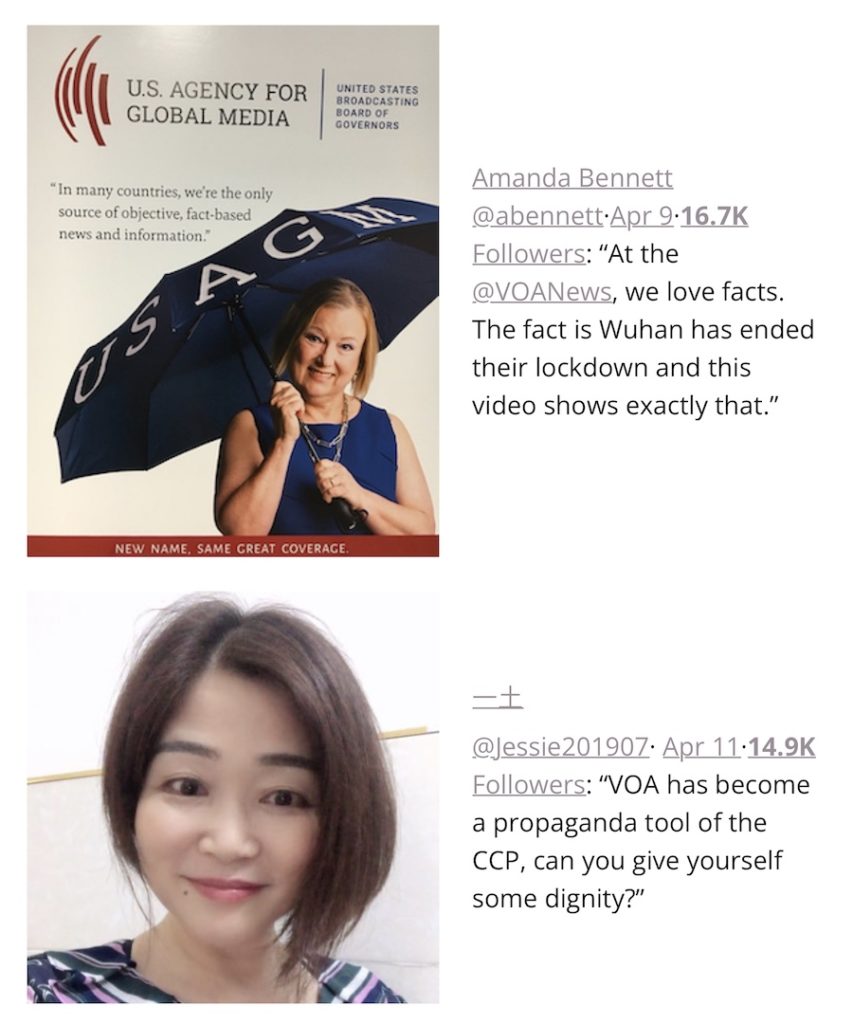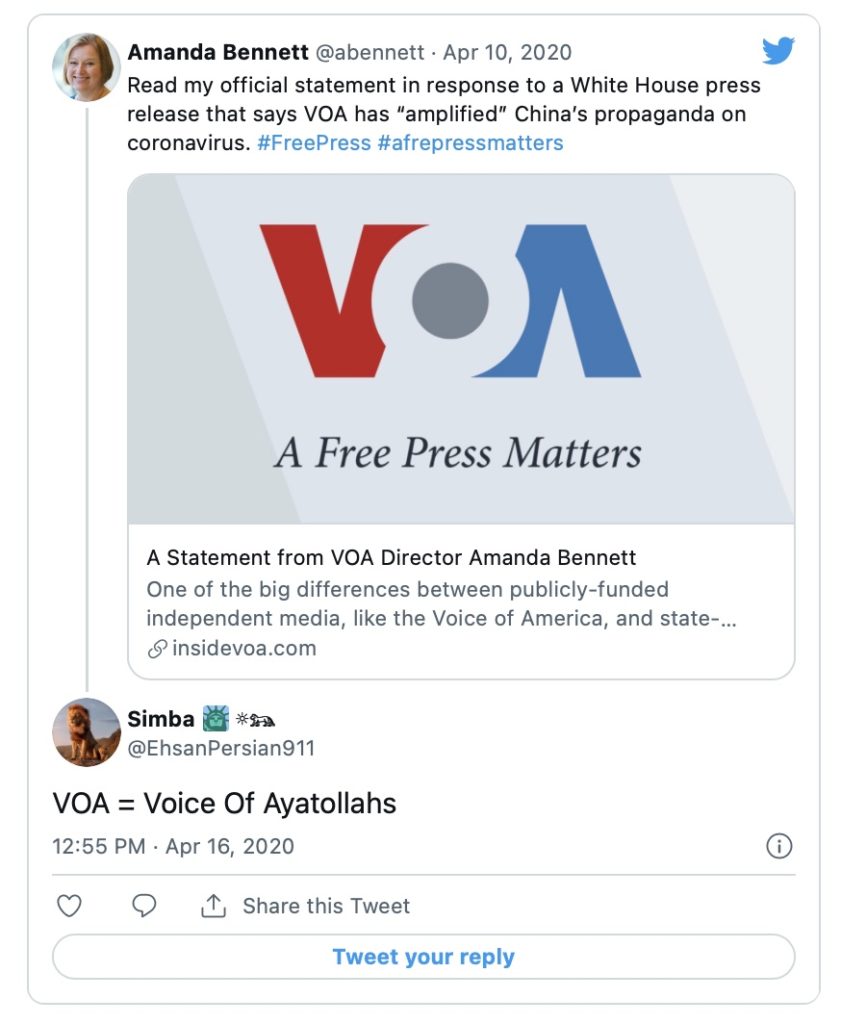Biden’s USAGM nominee Amanda Bennett appeared to have problems in public speaking and communicating with immigrant journalists when she was Voice of America (VOA) director. Numerous posts on social media show that Bennett offended many Chinese-Americans and Iranian-Americans by her comments and actions when she was in charge of the Voice of America.
USAGM Watch Commentary
USAGM nominee Amanda Bennett was a target of fierce criticism from Chinese-American and Iranian-American immigrant communities when she led VOA in the U.S. Agency for Global Media (USAGM), previously known as the Broadcasting Board of Governors (BBG). Immigrant and refugee journalists who heard her speak at the VOA China Branch in April 2018 were deeply offended by her remarks. In commenting on these reported remarks by Ms. Bennett, Ann Noonan, executive director of the independent Committee for U.S. International Broadcasting (CUSIB – cusib.org), said in 2018 that it’s hard to imagine another U.S. Government official or an American executive in a major U.S. media company speaking in such a way to native-born American journalists.
“I am honored by this nomination,” Bennett told VOA after the White House announced President Biden’s intent to nominate her for the position of USAGM CEO. “If confirmed, I will be so proud to work with all the dedicated journalists at USAGM who are doing the critical and difficult work around the world of upholding and demonstrating the value of a free press.”
USAGM Acting CEO Kelu Chao announced the nomination in an email to all staff. “We look forward to her congressional confirmation and her arrival!” Chao said.
In her short talk at the Voice of America China Branch in 2018, Biden’s USAGM nominee Amanda Bennett repeatedly said “you know” and made comments which offended immigrant journalists from China.
AMANDA BENNETT IN 2018 (PRESIDENT BIDEN’S CURRENT NOMINEE FOR USAGM CEO): […]we’ve got a lot of candidates that came in who are super fluent in Mandarin, you know. But that was it. What good is that gonna do? You guys all speak Mandarin, you know, and Cantonese, you know. Why would I hire someone to do what all of you guys are able to do? What we need is a leader. Right?


Bennett’s tenure at VOA saw numerous scandals, some of them unprecedented in scope and nature.
Michael McCaul, R-Texas, the ranking member of the House Foreign Affairs Committee, expressed concerns about Bennett’s nomination. “I have several concerns about this nominee’s hyper-partisan record,” he told Government Executive in a statement. “As they consider her nomination, I urge my Senate colleagues to closely scrutinize her habits of mismanaging content and playing favorites in personnel practices.”
Amanda Bennett has her media and NGO supporters, including some some VOA journalists whom she praised promoted. A few of them were later accused of various journalistic transgressions and had to be reassigned.
Among her outside supporters, David Seide, senior counsel at the Government Accountability Project, who has represented Bennett in the past, is quoted in Government Executive that he is “absolutely delighted at the nomination” due to her years of experience in media and running Voice Of America as well as “outstanding judgement.”
While being criticized by some members of the Chinese American community and some Chinese American refugee journalists, Bennett has consistently denied that, in her job as VOA director, she caved in to pressure from the Chinese government.
For more background information, USAGM Watch is reposting our April 12, 2018 commentary. Biden’s USAGM nominee Amanda Bennett served at that time as VOA director.
What good can speaking Chinese do for boss of Voice of America to China?, VOA Director asks
BBG Watch Commentary
April 12, 2018

Remarks to the Chinese American staff made this week [April 2018] by Voice of America (VOA) director Amanda Bennett, who — according to numerous reports — had ordered the shortening of the April 19, 2017 VOA interview with Chinese billionaire whistleblower Guo Wengui in what critics say was in response to pressure from the Chinese government (she denies caving in to pressure and insists she was protecting universal journalistic standards), are again turning a lot of heads in the VOA China Branch and among other VOA broadcasters.
Announcing to the Chinese American staff the appointment as China Branch Chief of a non-speaker of Chinese (does not speak Mandarin or Cantonese) and lacks any significant experience in China reporting or analysis, Bennett asked in reference to the ability to speak fluent Cantonese or Mandarin, “What good is that gonna do? … someone with big language fluency but no leadership,” and proceeded to laud the new non-Chinese, non-Asian American China Branch Chief for being instead “a leader” and “a mover.”
We were told that some of the other candidates for the VOA China Branch Chief position were native Chinese speakers with many years of experience as journalists and managers at VOA.
Shortly after the Guo Wengui incident last spring, the management of the Voice of America and its parent federal agency, the Broadcasting Board of Governors, put five VOA Mandarin journalists on forced administrative leave with pay. Of the so-called VOA Mandarin 5 Chinese-speaking managers, editors and broadcasters, three are still unable to return to work and were reportedly threatened with firing.
Those who were present during Amanda Bennett’s meeting with the China Branch staff this week said that VOA journalists appeared uncomfortable and were reluctant to ask questions. When asked by the new Branch Chief “why in the world she would hire or transfer a guy who does not speak Cantonese or Mandarin” and has limited China-related experience, Ms. Bennett attempted to be humorous.
“You don’t speak Cantonese or Mandarin?,” Ms. Bennett reportedly remarked.
Those who were present said that there was nervous laughter in the room after her rhetorical question followed by more of her comments:
VOA DIRECTOR AMANDA BENNETT [2018]: “You know, you know what. We, the skill set that we need here right now is excellent journalism, experience, ah, collaborativeness, and fearlessness. And I think, you know, you can see that Ernie has got all of those things. And, you guys are going to, you guys are going to be able to help him make up that. You know, if you’re weighing something, you know, we’ve got a lot of candidates that came in who are super fluent in Mandarin, you know. But that was it. What good is that gonna do? You guys all speak Mandarin, you know, and Cantonese, you know. Why would I hire someone to do what all of you guys are able to do? What we need is a leader. Right? And Ernie is a leader. Ernie has proved over and over again that he’s a leader. And so when you’re weighing things — you know, language fluency, leadership — and, you know, you get someone with big language fluency but no leadership. You know, he’s a mover. Really strong leadership. We can figure out, and you guys already proved you can figure out, how you make up for that. So, that’s my answer.”
In commenting on these reported remarks by Ms. Bennett, Ann Noonan, executive director of the independent Committee for U.S. International Broadcasting (CUSIB – cusib.org), said that it’s hard to imagine another U.S. Government official or an American executive in a major U.S. media company speaking in such a way to native-born American journalists.
Ms. Noonan called the Voice of America director’s reported comments to the VOA China Branch staff “more of a disappointment than most could have imagined.” Ms. Noonan also called for a congressional investigation of Upper Management’s responsibility for the 4-19-2017 Guo Wengui incident and the plight of the rank and file VOA Mandarin Service journalists.
“Everyone remains surprisingly quiet about it. After the 4/19 incident [Upper Management’s shortening of the Guo Wengui interview and placing five VOA Mandarin Service journalists on forced administrative leave], they learned the consequences of speaking up,” one VOA China Branch reporter who wants to remain anonymous because of fear of reprisals was quoted as saying.
There is reportedly quiet outrage about the plight of the VOA Mandarin journalists among some VOA and BBG employees but surprisingly very little reporting on the VOA troubled China and Iran services and BBG/VOA’s Upper Management by mainstream U.S. media or media freedom organizations except for CUSIB and occasional columns in The Washington Times, The Washington Examiner, The Washington Free Beacon, The Wall Street Journal and a few other media outlets.
In response to a request by four members of Congress, there has been an investigation by the Office of Inspector General (OIG) of the Guo Wengui incident and an OIG report is expected to be issued. There are also reports that a least one member of Congress may want to call for a congressional hearing to investigate why and how the VOA management ordered the interview to be shortened and how it treated the journalists who disagreed with their decision.
In requesting earlier an OIG investigation, Senator Marco Rubio, Rep. Edward Royce, Rep. Chris Smith and Rep. Robert Pittenger wrote: “We cannot allow pressure from China to dictate VOA’s ability to broadcast the truth into China.”
U.S. lawmakers noted allegations that shortly before the live interview with Guo Wengui was to be broadcast by the VOA Mandarin Service, “the Chinese government went to extraordinary lengths to stop the broadcast, including threatening the visas of VOA reporters in Beijing and multiple demands by the Chinese Embassy in Washington to cancel the interview.”
The letter, dated August 28, 2017, was signed by a member of Senate Committees on Appropriations, Foreign Relations and Select Committee on Intelligence U.S. Senator Marco Rubio (R-FL); Chairman of the House Foreign Affairs Committee Rep. Edward Royce (R-CA); a senior member on the Foreign Affairs Committee and Co-Chairman and the highest-ranking House member of both the bipartisan House/Senate Commission on Security and Cooperation in Europe (CSCE), and the bipartisan House/Senate/White House Congressional-Executive Commission on China Rep. Chris Smith (R-NJ); and Commissioner of the Congressional-Executive Commission on China and Vice-Chairman of Terrorism and Illicit Finance Subcommittee Robert Pittenger (R-NC).
In the 1980s, Ms. Bennett was a Wall Street Journal correspondent in China. While at the Journal, she shared with her colleagues a Pulitzer Prize for National Reporting on ethical issues in combating the AIDS epidemic in the United States. Her husband is chairman of a corporation whose holdings include an educational services business in China, according to information available online. Former Democratic Chairman of the BBG Board and still listed as a current BBG board member, Jeff Shell, under whose former BBG chairmanship John F. Lansing was hired in 2015 to lead the BBG as a federal government CEO and Amanda Bennett was hired as a federal government senior executive in 2016 to lead VOA, was also reported to be doing major corporate business in China on behalf of a Hollywood entertainment company where he is a chief executive, according to information also available online.
To our knowledge, there have been no known public statements or explanations from the BBG Board on private, corporate or family business links in China of any senior federal agency officials, past or present. During the Cold War, such outside business interests of high-ranking U.S. officials or rank-and-file employees in communist-ruled countries did not exist and would not have been tolerated, but current legislation with regard to the BBG does not specifically forbid them and even calls for BBG members to be recruited from private U.S. media industry where such links are now common. Some of the past BBG Board members who had influence over personnel selections at the agency, including at VOA and Radio Free Europe/Radio Liberty (RFE/RL), also were reported to have had business interests in Russia. As demonstrated by the shortening of the Guo Wengui interview, placing of five VOA Mandarin Service journalists on forced administrative leave and her praise for the non-Chinese speaker selected to be the China Branch Chief, Amanda Bennett has a direct and powerful influence over both programming and personnel decisions at the Voice of America. John F. Lansing, also an Obama administration era appointee, is running the agency well into the second year of the Trump presidency.
President Trump has not yet submitted to the U.S. Senate for confirmation his nominee to replace Lansing. Michael Pack, an award-winning film documentarian and former USIA/Worldnet and Corporation for Public Broadcasting executive, has been reported as still waiting for a clearance for his nomination to move forward.
Neither Bennett nor Lansing was required to be confirmed by the U.S. Senate or vetted by Congress through a nomination and confirmation process. Both had no significant prior experience in foreign policy, public diplomacy or managing the federal workforce. Commenting on Ms. Bennett’s performance, CUSIB Executive Director Ann Noonan said that in her opinion, Ms. Bennett “completely lacks a foreign policy lens.”
